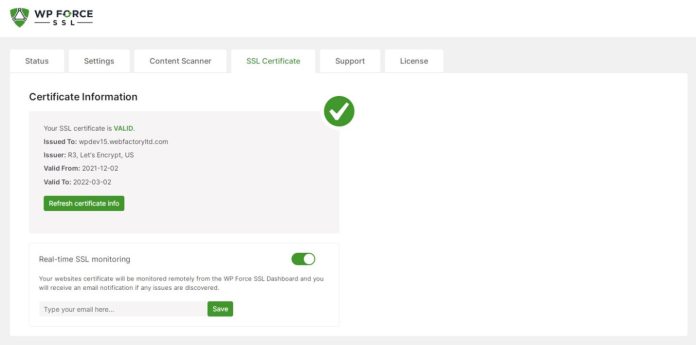As we all know, over the last few decades, the Internet has grown exponentially. Many reasons contributed to this, like faster speeds, more reliable data transfers, worldwide accessibility, etc. Something so wide as the web that contains so much data was always going to be hard to govern, and a system needed to be put in place that would serve as an overall safety guarantee.
That, over time, turned out to be the SSL certificate which is now a mainstay way of identifying a safe site. Because this is such an essential part of any site, we’ve decided to go through everything you need to know about SSL.
Why Is SSL Essential?
All Heading

As we’ve mentioned, the SSL certificate is the primary way of authenticating/identifying a secure site, and the incoming and outgoing connections are encrypted. While the security aspect is paramount, the display is equally important. Seeing the padlock on the left side of your URL means the site is secure, and when you see it, you know everything is legit.
Because of the evolving nature of the web, it’s important to keep these security measures up to date. Therefore, SSL certificates have an expiry date and need to be renewed, and in doing so, they’re instantly updating their security measures.
How Does an SSL Certificate Operate?
The SSL (Secure Sockets Layer) certificate represents a set of automated processes that work in the background within the browser any time you try accessing a page/site. Without going into too much technical detail, this is how it works:
- The user attempts to access a specific site through the browser (any browser)
- Upon receiving the request, the browser sends a query to the site asking for the SSL certificate
- The site answers, offering an SSL certificate
- If the certificate proves to be valid, an encrypted connection is made, and access to the site is granted
In case the SSL certificate isn’t valid in the third step, for whatever reason, the browser will block access to the site or, at the very least, warn you there could be problems ahead.
SSL Certificate Validation and Types
You’ll probably be surprised to hear that the “SSL” certificate doesn’t work with SSL protocols. The superior underlying protocols are TLS (Transport Layer Security), which are currently up to version 1.3, and work in much the same way SSL did back in the day (authenticate and encrypt data).
It’s important to differentiate certificates from protocols. Almost every site nowadays uses TLS protocols because they’re the better solution. However, everybody still refers to the certificates as SSL certificates, which could only be a remnant of past times when SSL was used. There’s been a push to “rectify” the naming situation in recent years, but it hasn’t had much traction.
SSL Certificate Benefits

We’ve already covered some benefits SSL brings to the table, but let’s reiterate once more:
- Security – SSL certificates have been universally accepted as the best overall security measure for encryption and authentication. Naturally, we’re talking about the average site, not some highly protected corners of the web.
- Recognition – the SSL certificate has become the standard in web security measures. As such, it’s much easier to detect safe sites from unsafe ones, but it also means you need the certificate regardless of your thoughts about it. We could easily call the SSL certificate unofficially mandatory.
- Encrypted sharing – with SSL certificates, you aren’t just guaranteeing the safety of the content you’re putting out in the world but also all data received by your site. Many sites nowadays require personal information, which is highly sensitive data. Having a safe system that’s immediately visible to your users will leave them without any doubts about whether it’s safe to send that data.
- Implementation – probably one of the reasons why SSL certificates became such a popular security tool is the low number of resources they use. Working in the background, the authentication process is completed almost instantly, at least from the frontend perspective. This is all done without any apparent negative effects on the browsers or the site’s overall performance.
Install WP Force SSL on Your Website
If you’ve gotten to this point, you’re aware of the importance of SSL certificates, most prominently that they need to be obtained and then maintained because they can expire. Now, most hosting services will provide you with a certificate, or you can obtain one from a service like Let’s Encrypt for free, and you could potentially manually check for the expiration date now and again, but why would you.
The main reason why WordPress is so great is the virtually infinite number of plugins you can integrate that are all designed to make your life easier. One of these plugins is WP Force SSL, and it will provide you with everything you might need SSL-wise.
If you haven’t gotten an SSL certificate by other means, you can obtain it directly through the plugin. Furthermore, WP Force SSL represents the perfect tool for automatic monitoring and manual content scanning. The former will look for the expiry date and any of over a hundred documented errors that could occur to mess with the validity of the certificate.
At the same time, the latter works best for signaling out and fixing mixed content errors that could lower the page from the secure HTTPS to the not-so-secure HTTP designation. Speaking of the page designation, WP Force SSL will automatically redirect your visitors from HTTP to HTTPS pages, making them at the same time more secure and having a better SEO rating.
What Is HSTS, and Why Should You Use it?
HSTS (HTTP Strict Transport Security) is a security measure that informs the user’s browser, through a response header, how to handle the connection. More specifically, it forces incoming connections to use HTTPS encryption, disregarding any script that wants to load pages through HTTP encryption. This minimizes the chances of any unwanted intrusions.
Why you should use it is rather obvious. Hackers could attempt to hijack the connection if security is lowered and steal personal data or even redirect the unsuspected user to a malicious site they’ve prepared beforehand. Forcing stronger encryption makes this far less likely to happen.
If for some reason, that’s not enough, HTTPS encryption on pages is one factor in the Google algorithm, and using it will bump your pages up the list. That reason alone is usually enough to take action.
Easy Fixes For Common Problems

One of the often-overlooked benefits of SSL certificates is that many issues that arise have quick and easy solutions because they’re a standardized measure. Naturally, some problems would need a professional to handle. Still, more often than not, you’ll be able to make your certificate fully valid and your pages fully secure in just a couple of actions.
So let’s say your certificate isn’t working and/or your pages have dropped down to HTTP encryption. What can you do to rectify the situation:
- Verify your SSL certificate hasn’t expired – if you haven’t taken us up on our advice and gotten a plugin that notifies you in case of expiry, you’ll need to manually check. This is by far the main reason an SSL certificate would be invalid.
- Clear website, hosting, and browser cache – you’d be surprised how many times clearing your cache helps in these situations. Sometimes data simply goes “iffy” – something isn’t stored right or is overwritten/added/removed in an incompatible way, or something else entirely, and you’re left with issues to solve. Clearing the cache gives you a new slate to work with.
- Identify and correct mixed content issues – we’ve already touched on this, but let’s dig deeper. Everything must be up to HTTPS standards because all content on your page is taken into account for your ultimate page prefix. If you have any data, like audio files, videos, etc., that only have HTTP encryption, they’ll bring the whole page’s security rating down to their level, making the page open to attack. WP Force SSL has a great scanner feature that both identifies and fixes any mixed content errors you might have.
- Configure HTTPS for the Google search console – this has as much to do with the page manager and all web users in general. Essentially, you’ll manually change the Google settings in your browser to only show pages with the HTTPS prefix, ignoring all others.
Summary
The benefits of an SSL certificate and there are many, are ultimately mute in the grand scheme of things because you’re required to have one. When you approach the situation that way, why not make it easier on yourself and get a plugin that will handle everything for you, leaving you to focus on one of the many other things that go into a successful site.
With a plugin like WP Force SSL, you’ll be getting a complete solution for everything you might need.














Recent Comments